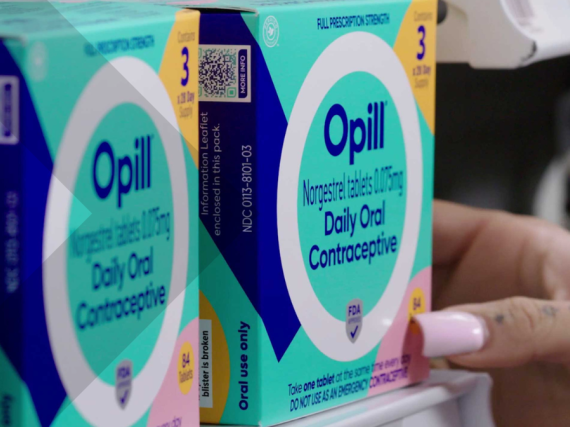Helping Missourians Achieve Reproductive Well-Being
As the Executive Director of Missouri Family Health Council (MFHC), Michelle Trupiano is working to ensure that all Missourians have the power to decide if, when, and under what circumstances to get pregnant and have a child. MFHC is committed to reducing access barriers so that people can receive quality, culturally sensitive sexual and reproductive health care, and health education.
Recently, Michelle spoke with us about the why she entered the reproductive health field, the state of reproductive health care in Missouri, and how she sees the future.
You are a recognized leader of reproductive health. Why did you become interested in working on this issue? How did you come into the reproductive health universe?
I am a proud social worker. I first started my career working in direct service both with the homeless population and in foster care. And while I loved working with individuals, I was often frustrated by the larger policies and systems failing people day in and day out. When I went to get my master’s in social work I was introduced to policy and system change as a form of social work. I saw the impact of community organizing and went to the capitol for the first time. I was hooked. My passion was for community organizing and I sort of landed in reproductive health by taking a grassroots organizing position at Planned Parenthood of the St. Louis Region. Honestly, I didn’t know a ton about reproductive health at that time and often wondered why they hired me. My boss told me they hired me because I had a passion for organizing and finding ways to bring people together and raise their collective power. That was twenty years ago, and I have never looked back. I have learned so much over the years and have had the privilege or people sharing their deeply personal stories with me which has forever changed me.
Tell us about MFHC and your long-time contribution to residents of Missouri?
For forty years, Missouri Family Health Council, Inc. has worked to ensure access for every Missourian to high-quality, affordable, and confidential reproductive and sexual health care. We’re a private, nonprofit organization based in Jefferson City with a dedicated team of 12 full-time staff members.
Although folks generally know us as the state’s sole Title X family planning program grantee, our organization has a robust advocacy program, and we also serve as the Program Office for the privately funded initiative, The Right Time.
Our advocacy work is focused on increasing health equity and access to reproductive and other safety net services by championing changes in policy and regulation that increase affordability, quality, and accessibility of health care for Missourians.
Ultimately, we’re striving to achieve health equity in Missouri by ensuring all people have access to quality reproductive health education and services, including the full range of contraceptive methods. Over the last four decades, hundreds of thousands of people have had access to quality contraceptive counseling, education, and methods, as well as other related services, because of our work. This has allowed people to have true self determination about the course of their life.
How does MFHC support The Right Time initiative? And what is The Right Time trying to achieve?
MFHC serves as the Program Office for The Right Time, which is a six-year initiative seeking to address persistent health disparities in unintended pregnancy, as well as to inspire individuals to take control of their own health by offering free or low-cost birth control to all those who need it.
The Right Time works with health care providers to provide patient-centered counseling, offers no-cost contraception for uninsured and underinsured clients, and galvanizes individuals and stakeholders to support and influence factors essential to providing accessible contraceptive care. MFHC supports participating The Right Time health centers by providing training, technical assistance, and ensuring health centers have all the tools needed to provide high-quality reproductive health care. We’re committed to empowering Missourians so they can pursue the future they want.
How would you gauge the success of the project to date?
As of November 2020, The Right Time initiative has served over 16,000 adults and adolescents, which we consider a win. But we also know there’s nearly 300,000 Missourians who are in need of publicly funded family planning services, so we definitely have our work cut out for us. Missourians who are geographically isolated face unique hurdles to receiving reproductive health care – ensuring rural populations are able to access contraceptive care as easily as most urban dwellers can remains a high priority for The Right Time.
Additionally, more providers are trained in counseling and delivery of all contraceptive methods which has really improved access to services.
What do Missourians need and want when it comes to reproductive health?
All Missourians deserve access to affordable, confidential, quality reproductive health services no matter their insurance status or zip code. In August, we voted to expand Medicaid eligibility in Missouri, which was a huge policy win for advocates. By passing Medicaid expansion, Missourians showed our legislature that accessible health care (including reproductive health services) is a high priority.
I also firmly believe that Missourians – and all Americans – deserve the right to access reproductive health care without interference from elected officials. Unfortunately, reproductive health care across the country has been extremely politicized; we have a lot of politicians in Missouri who think they know more about health care than our medical professionals. I think the majority of Missourians would prefer their elected representatives stick to politics rather than trying to play doctor.
What keeps you awake at night?
I worry about health centers keeping their doors open to be able to serve their communities. There are countless barriers they face, from COVID to funding reductions to a hostile political environment. I don’t think people always recognize how hard this work is and the emotional toll it can take on providers and administrators, especially those on the front lines in a politically hostile state where every move they make is scrutinized and judged.
I worry about patients and do they know about our programs and can they access them. I worry if we are doing enough, especially to address the racial disparities that run deep in Missouri. I worry about my team and whether they are taking on too much and heading towards burnout.
But, even though I may have sleepless nights, I remain as committed as ever to this moment. I have a fantastic and resilient team that teaches me every day. I have amazing colleagues across the country who are always willing to brainstorm and lift each other up. Even though I have many worries I know that I am not alone and I have a lot of hope for the future.



